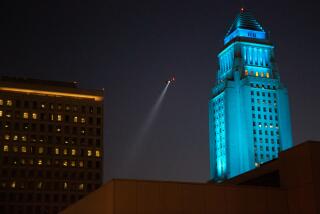Lottery Chief Accuses Controller of Waste : Government: Sharp says declining revenues should mean less costs for auditing by Davis’ office, but it has not occurred. The two officials have been feuding over gaming agency’s administrative costs.
- Share via
SACRAMENTO — Lottery Director Sharon Sharp, whose agency has often been criticized by state Controller Gray Davis, has accused the controller of waste and inefficiency.
In a biting letter to Davis, Sharp complained that the controller, who is required by law to audit the lottery’s financial operations, has done little to reduce costs even though, Sharp contends, the controller’s workload has lessened because of declining lottery revenue.
As a result, Sharp said, the lottery has had less money to turn over to California schools. Under state law, education is entitled to all lottery earnings after prizes and overhead have been paid.
Officials said the lottery--which is required to use the controller--pays the controller about $3 million a year for auditing services. The total lottery revenue that is audited is $1.76 billion.
“I am distressed to have learned . . . that while the lottery, like all governmental agencies, has been working to increase efficiency and control expenses, you have not reduced your office’s expense for lottery operations over the past eight years, in spite of decreases in workload,” Sharp wrote to Davis on Sept. 7.
Sharp’s criticism comes two months after Davis publicly scolded the lottery for overspending its budget and complained that excessive administrative costs had reduced the amount of revenue the lottery was able to turn over to the schools.
Agency officials and the controller’s office have been at odds for years over the role of auditors at the lottery. Davis has criticized the lottery often, causing lottery officials to complain privately that Davis is using them for political exposure.
In response, Davis said Monday that any decrease in workload has been offset by the introduction of new lottery games--Keno, Fantasy Five and Daily 3--which, he said, placed new demands on his office.
He said Sharp was assuming incorrectly that because lottery revenues have fallen, the workload of auditors would be reduced accordingly. But, he said, the lower revenues did not affect the amount of work in his office.
“I’m somewhat amused and puzzled by the director’s letter. It’s clear to me that she has been misinformed,” he said.
For two years in a row, the lottery has spent more than 16% of its revenue--the limit set by law--on administrative expenses.
To ensure that overspending will not cause education to lose money in the future, Davis said interest income earned by the lottery would be turned over to the schools. In the past, the lottery has been unfettered in using interest earned on prize money.
Joanne McNabb, a lottery spokeswoman, said the controller has made it more difficult for the lottery to budget its money because the controller’s estimates of auditing expenses are often inaccurate. This year, the controller’s charges were $200,000 higher than Davis had projected, she said.
The lottery’s administrative budget last year was about $280 million.
More to Read
Get the L.A. Times Politics newsletter
Deeply reported insights into legislation, politics and policy from Sacramento, Washington and beyond. In your inbox twice per week.
You may occasionally receive promotional content from the Los Angeles Times.










